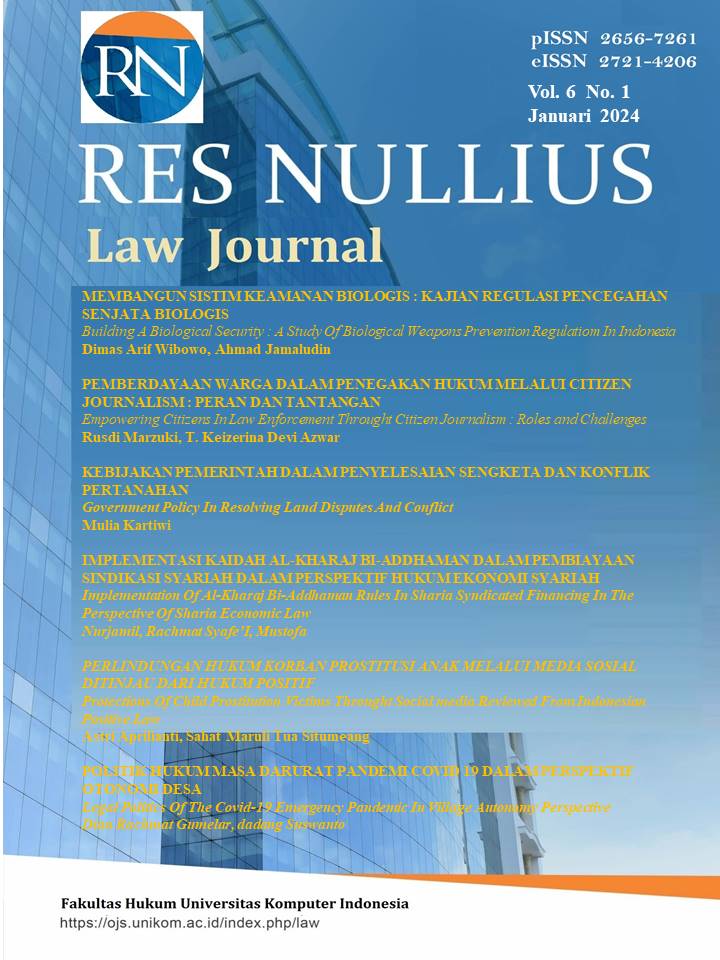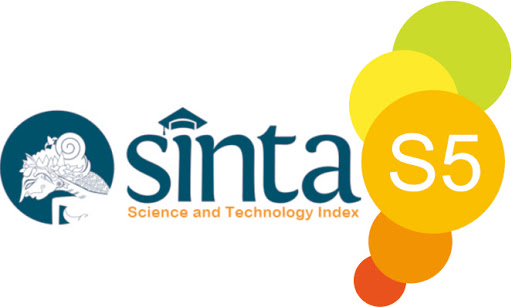IMPLEMENTASI KAIDAH AL-KHARAJ BI-ADDHAMAN DALAM PEMBIAYAAN SINDIKASI SYARIAH DALAM PERSPEKTIF HUKUM EKONOMI SYARIAH
Implementation Of Al-Kharaj Bi-Addhaman Rules In Sharia Syndicated Financing In The Perspective Of Sharia Economic Law
DOI:
https://doi.org/10.34010/rnlj.v6i1.11676Keywords:
Al-Kharaj Bidhdhaman, Sharia Economic Law, Syndicated FinancingAbstract
The goal of this study is to describe the application of the Al-Kharaj Bidhdhaman rule, which specifies who bears the risk and who is entitled to a well-known benefit in sharia business contracts, particularly when applied in syndicated financing carried out by financial institutions as viewed through the lens of sharia economic law. This is a library study that employs qualitative descriptive research methods. Secondary data from books, journals, and other research results are used by researchers to describe the rules in sharia business contracts, also known as legal maxims, and theories about syndicated financing in financial institutions such as banks, which are then normatively analyzed in accordance with laws and regulations. According to the study's findings, the al-Kharaj Bidhdhaman Rule is also a very important rule in syndicated financing-based business activities at Islamic Banks, which is implemented in the agreed clauses in the contract used by customers, bank leaders, and participants of sharia syndicated financing, where the profits obtained by the parties are adjusted to the value of the syndicated participants' capital and the value of the syndicated participants' capital In mudharabah and musharakah-based contracts, the same value is applied for responsibility for the emergence of risks, including losses, which are, of course, excluded if they occur due to force majeure.
References
Arifandi, F. (2018). Qawaid Fiqhiyyah Sebagai Formulasi Hukum. Rumah Fiqih Publishing.
Ariswanto, D., Warang, Z., & Azizi, A. W. (2021). Pembiayaan Sindikasi Bank Syariah di Indonesia dalam Perspektif Hukum Ekonomi Syariah. J-Alif : Jurnal Penelitian Hukum Ekonomi Syariah Dan Budaya Islam. https://doi.org/10.35329/jalif.v6i2.1893
darmawan. (2020). Kaidah-kaidah Fiqqhiyyah. Reva Prima Media.
DEWINTARA, E., & Sarmila. (2022). Penerapan Konsep Ekonomi Abu Yusuf Dalam Kitab Al-Kharaj (Perpajakan) Saat Ini. BANCO: Jurnal Manajemen Dan Perbankan Syariah. https://doi.org/10.35905/banco.v3i1.2596
Hamzah Salamah Nahar Gharir. (2019). قاعدة الخراج بالضمان وأثرها على الحسابات الجارية في المصارف الإسلامية. Dirasaat, Ululussyariah Wal-Qanun, 1, 329.
Karim, A. (2011). Bank Islam: Analisa Fiqih dan Keuangan. PT. Rajagrafindo Persada.
Muhammad Mufid. (2019). Kaidah Fikih Ekonomi dan Keuangan Kontemporer, Pendekatan Tematis dan Praktis (1st ed.). Prenamedia Group.
Rachmad Risqy K dan Umi Aslimah. (2022). Penerapan Kaidah Al-Kharaj Bid Adh-Dhaman dalam Pembiayaan Mudharabah di Perbankan Syariah. STIE SEBI.
Safriadi, S. (2019). ISTIQRĀ’ DAN PENERAPANNYA TERHADAP AL-QAWĀ`ID AL-FIQHIYYAH. Jurnal Ilmiah Mizani: Wacana Hukum, Ekonomi Dan Keagamaan. https://doi.org/10.29300/mzn.v5i2.1439
Sjahdeini, S. R. (1997). Kredit Sindikasi: Proses Pembentukan dan Aspek Hukum. Midas Surya Grafindo.
Suhel Ahmad Fadel Hawamdeh. (2016). The Rule Kharaj for Guarantee and Contemporary Applications : the Murabaha in the Jordan Islamic Bank. ”, FSM İlmî Araştırmalar, 8, 183.
Downloads
Published
Issue
Section
License

Ciptaan disebarluaskan di bawah Lisensi Creative Commons Atribusi 4.0 Internasional.












